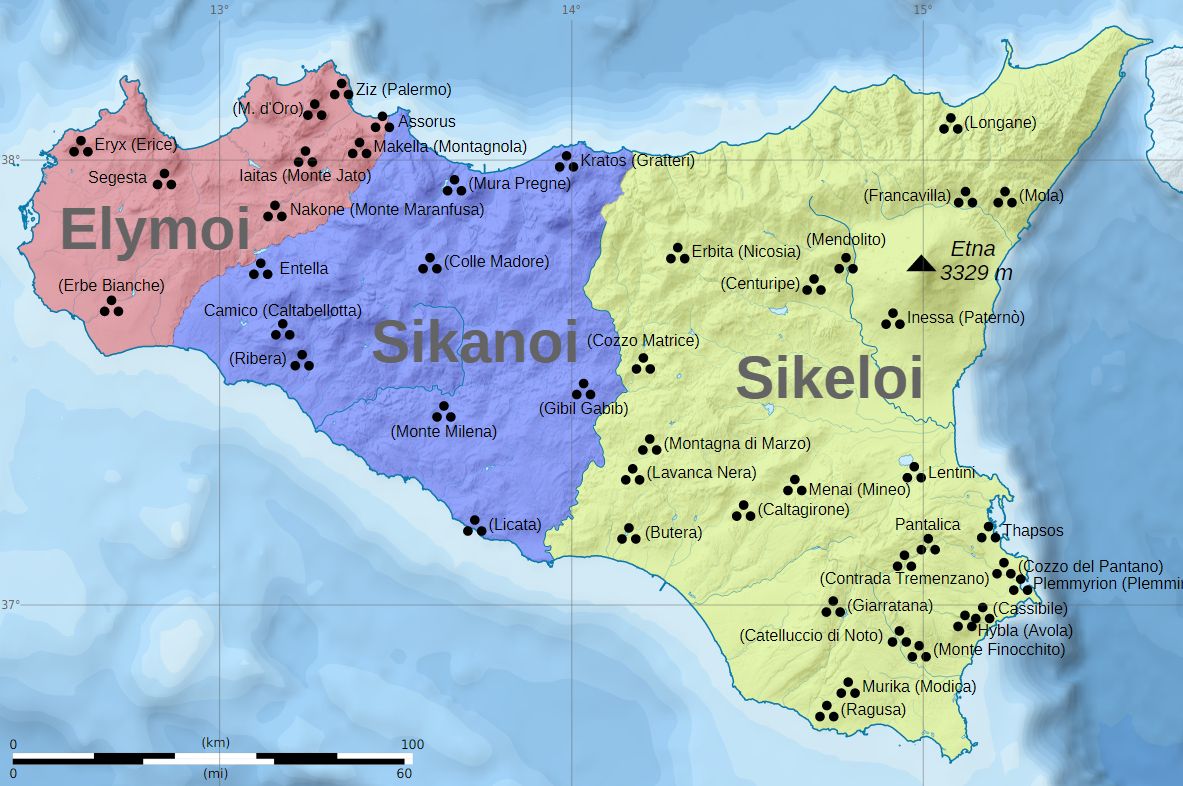The Elymians were an ancient tribal people who inhabited the western part of Sicily during the Bronze Age and Classical antiquity. They are indistinguishable from their Sicani neighbours in the archaeological record of the early Iron Age. Thereafter they appear to have adopted many aspects of the culture of the Greek colonists of Sicily, erecting the remarkable temple at Segesta and using the Greek alphabet to write their own language.
The Elymians maintained friendly relations (and alliances) with Carthage but came into frequent conflict with the expansionist Greek colonies of western Sicily, especially Selinus. The Elymians were granted a privileged status under Roman rule and were exempted from taxes. This was said to have been in recognition of the Elymians' claim of Trojan ancestry, which was seen as making them cousins of the Roman people, who also claimed to have been descended from the Trojans. The Elymians appear to have largely disappeared from view under Roman rule, presumably becoming assimilated into the general Sicilian population.
The Sicani or Sicanians were the other ancient people of Sicily present at the time of Phoenician and Greek colonization. The Sicani dwelt east of the Elymians and west of the Sicels, having, according to Diodorus Siculus, the boundary with the last in the ancient Himera river (Salso) after a series of battles between these tribes.
In the 5th century BCE, the Greek historian Thucydides, claims that the Sicani originated on the Iberian Peninsula, from around a river they called "Sicanus" and had migrated to Sicily following an invasion by the Ligurians. Conversely, Timaeus of Tauromenium (writing c. 300 BCE) considers the Sicani to be indigenous to Sicily. A third theory, put forward by some modern scholars, suggests that the Sicani were Illyrian émigrés, who gained control of areas previously inhabited by native tribes. Archaeological research suggests that the Sicani were influenced at an early stage by the Mycenaeans (prior to the Greek colonisation of Sicily). The Sicani enter the historical record with the Phoenicians, who established colonies during the 11th century BCE – preceding the Greeks. The Sicani were gradually absorbed by these colonizing peoples. They disappeared as a distinct people following the annexation of Sicily by the Roman Empire.
The Sicels or Siculi were an Italic tribe who inhabited eastern Sicily during the Iron Age. It is possible that the Sicels and the Sicani of the Iron Age had consisted of an Illyrian population who (as with the Messapians) had imposed themselves on a native, Pre-Indo-European ("Mediterranean") population. Their social organization appears to have been tribal, economically and agriculturally. Archaeological evidence points towards their arrival on the island between the thirteenth or eleventh century BCE.
The Elymians maintained friendly relations (and alliances) with Carthage but came into frequent conflict with the expansionist Greek colonies of western Sicily, especially Selinus. The Elymians were granted a privileged status under Roman rule and were exempted from taxes. This was said to have been in recognition of the Elymians' claim of Trojan ancestry, which was seen as making them cousins of the Roman people, who also claimed to have been descended from the Trojans. The Elymians appear to have largely disappeared from view under Roman rule, presumably becoming assimilated into the general Sicilian population.
The Sicani or Sicanians were the other ancient people of Sicily present at the time of Phoenician and Greek colonization. The Sicani dwelt east of the Elymians and west of the Sicels, having, according to Diodorus Siculus, the boundary with the last in the ancient Himera river (Salso) after a series of battles between these tribes.
In the 5th century BCE, the Greek historian Thucydides, claims that the Sicani originated on the Iberian Peninsula, from around a river they called "Sicanus" and had migrated to Sicily following an invasion by the Ligurians. Conversely, Timaeus of Tauromenium (writing c. 300 BCE) considers the Sicani to be indigenous to Sicily. A third theory, put forward by some modern scholars, suggests that the Sicani were Illyrian émigrés, who gained control of areas previously inhabited by native tribes. Archaeological research suggests that the Sicani were influenced at an early stage by the Mycenaeans (prior to the Greek colonisation of Sicily). The Sicani enter the historical record with the Phoenicians, who established colonies during the 11th century BCE – preceding the Greeks. The Sicani were gradually absorbed by these colonizing peoples. They disappeared as a distinct people following the annexation of Sicily by the Roman Empire.
The Sicels or Siculi were an Italic tribe who inhabited eastern Sicily during the Iron Age. It is possible that the Sicels and the Sicani of the Iron Age had consisted of an Illyrian population who (as with the Messapians) had imposed themselves on a native, Pre-Indo-European ("Mediterranean") population. Their social organization appears to have been tribal, economically and agriculturally. Archaeological evidence points towards their arrival on the island between the thirteenth or eleventh century BCE.

No coins matching the search term(s)
